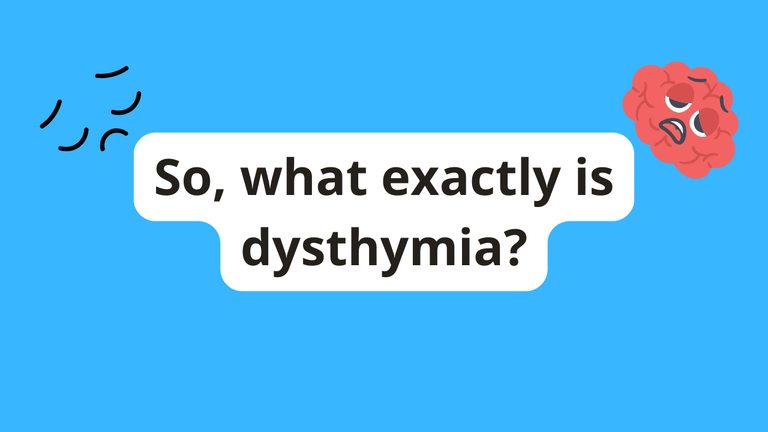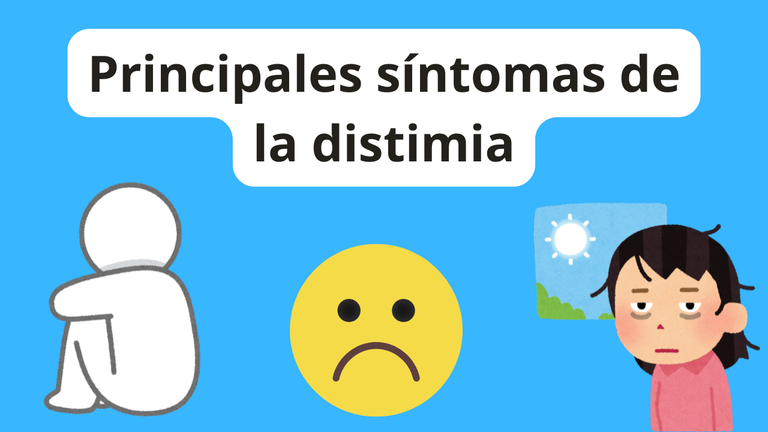![]()
Hi, how are you today? I’d like to talk to you about a topic that not everyone is familiar with, but one that many of us might relate to. Have you ever felt sad or unmotivated for a long time, to the point where you wonder if it could be depression, but not quite as intense? You might be experiencing something called dysthymia, also known as persistent depressive disorder.
¿Pero qué es la distimia?

So, what exactly is dysthymia?
Dysthymia, also called persistent depressive disorder, is like this constant feeling of being down that lasts for a long time, but it’s not as intense as major depression. It’s that low-level sadness or lack of motivation that can stick around for years. While it doesn’t completely knock you out, it does affect how you feel day to day. It can even become so much a part of you that you don’t realize it’s not just "who you are" — it’s actually something with a name, and it can be treated.

Principales síntomas de la distimia:
- Tristeza constante o mal humor que puede durar dos años o más.
- Falta de interés en actividades que solías disfrutar.
- Baja autoestima o sentirte inútil.
- Dificultad para concentrarte o tomar decisiones.
- Fatiga o falta de energía, incluso después de dormir bien.
- Cambios en el apetito: comer mucho o poco.
- Problemas para dormir o dormir demasiado.
Main Symptoms of Dysthymia:
- Constant sadness or bad mood that can last two years or more.
- Loss of interest in activities you used to enjoy.
- Low self-esteem or feeling worthless.
- Trouble concentrating or making decisions.
- Fatigue or lack of energy, even after a good night's sleep.
- Changes in appetite: eating too much or too little.
- Sleep problems: trouble falling asleep or sleeping too much.
El problema con todos estos síntomas es que, al ser más leves y prolongados, muchas veces no nos damos cuenta de lo que está pasando, o simplemente asumimos que 'así es nuestra vida'. Nos acostumbramos a sentirnos mal, como si fuera algo normal. Pero la realidad es que no tiene por qué ser así. La distimia se puede tratar, y muchas personas mejoran mucho con terapia, medicación, o incluso haciendo pequeños cambios en sus hábitos. A veces, solo hablar con alguien puede marcar una gran diferencia y ayudarnos a salir de ese estado que creíamos permanente.
The problem with all these symptoms is that, because they’re milder and last longer, we often don’t even realize what’s going on, or we just assume that 'this is how life is.' We get used to feeling down, as if it were normal. But the truth is, it doesn’t have to be that way. Dysthymia can be treated, and many people see significant improvements with therapy, medication, or even by making small changes to their habits. Sometimes, just talking to someone can make a big difference and help us get out of that state we thought was permanent.
Si te identificas con estos síntomas o te has sentido así por mucho tiempo, no lo ignores ni lo guardes para ti. Hablar con un profesional puede ser el primer paso para entender qué está pasando y encontrar maneras de salir de ese estado gris.
If you recognize these symptoms or have been feeling this way for a long time, don’t ignore it or keep it to yourself. Talking to a professional can be the first step toward understanding what’s going on and finding ways to come out of that gray state.
Si has leído hasta aquí, te doy las gracias de corazón. Te mando un abrazo a la distancia, y gracias nuevamente por tomarte el tiempo para leer. ❤️
If you've read this far, I sincerely thank you. I'm sending you a hug from afar, and once again, thank you for taking the time to read." ❤️

